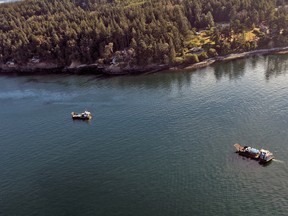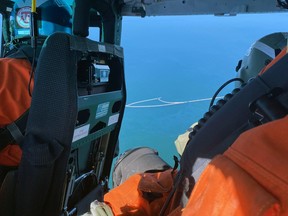An update from the US Coast Guard says the 50-foot Aleutian Island has moved since it sank Saturday off Washington state, near San Juan Island, about 15 miles east of Victoria. .

.
VICTORIA – Crews are working to drain fuel from a sunken fishing boat in US waters just east of Vancouver Island before it fouls a key feeding area for endangered southern resident killer whales.
Announcement 2
.
An update from the US Coast Guard says the 50-foot Aleutian Island has moved since it sank Saturday off Washington state, near San Juan Island, about 15 miles east of Victoria. .
The vessel, loaded with some 10,000 liters of diesel and oil, was originally about 30 meters deep, but US officials say it is now about 60 meters below the surface.
The coast guard says the extra depth presents more logistical challenges that the on-site dive team is working to resolve.

Divers are also trying to collect and remove a large fishing net that floated free from the wreck and the Coast Guard update says officials are watching the area closely even though no marine mammals have been reported nearby. .
Announcement 3
.
The stretch of Haro Strait where Aleutian Island sank is a protected area considered critical habitat for the remaining 74 southern resident killer whales and although pods were last seen only 50 kilometers away, the whales were believed to be they were moving west, away from the sunken ship.
An oil slick estimated to be several kilometers long now covers waters west of San Juan Island and US officials say it has moved into Canadian waters east of Victoria.
About 2,100 feet of barrier had been put in place by Monday night, the Coast Guard said in its latest statement, and drones were being used to monitor the brightness and watch for any marine mammals.
-
Sunken fishing boat off San Juan Island creates oil sheen, concern for resident killer whales
-
Baby Orca: Endangered Southern Resident Orcas welcome new addition
-
Southern resident killer whales don’t get enough to eat: UBC study
More news, less ads: Our in-depth journalism is possible thanks to the support of our subscribers. For just $3.50 a week, you can get unlimited, ad-lite access to The Vancouver Sun, The Province, National Post, and 13 other Canadian news sites. Support us by subscribing today: The Vancouver Sun | The province.





